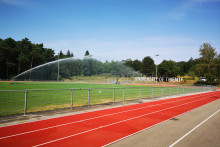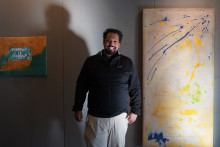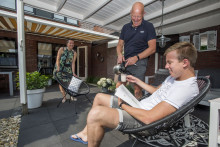Introduction weeks for first-year students after all...
For a while it was up in the air: would the introduction weeks for new students be cancelled, now that the number of infections is on the rise again? That won’t happen, said Prime Minister Mark Rutte on 6 August during the press conference. However, the Dutch government is planning on tightening the reigns. For example, universities and universities of applied sciences are required to host most of their introductory activities online. Only very specific activities may take place in small groups.
For sports and study associations, physical activities are only permitted if these are aimed at – yes, indeed – a combination of sports and studies. Please note that alcohol is strictly forbidden and that everyone must be on their way home by 10 p.m. During the introduction period, student associations need to make optimum use of online options as all face-to-face social and hazing activities are out of the question.
...but the Dutch parliament is not satisfied yet...
Allowing for a distinction between sports and study associations on the one hand and student associations on the other hand is something many political parties would prefer to avoid. Why should one association be allowed to organise in-person activities during the introduction weeks while another gets a firm ‘no’? This question was supported by a majority in the House of Representatives on Wednesday during a major coronavirus debate.
After all there are various societies aimed at activities such as rowing, chess, bridge and football where students also gather for drinks, according to MP Wybren van Haga. ‘Many of these associations had already been approved by the safety region. They were given the go-ahead, although based on very strict protocols.’ The parties are asking for a review of which (if any) activities organised by student associations could be organised safely. A resolution to this effect was adopted.
Prime Minister Rutte expressed that more activities will lead to more movement among students, which he says is risky business. However, he is interested in working with the safety regions to see if there are more options for activities of student associations with a specific focus on studying and sports. ‘I plan to explore this avenue’, he said. The safety council is scheduled to convene on Monday.
...and the same goes for Minister De Jonge
Later during the debate Minister Hugo De Jonge of Public Health and the Environment addressed students directly and reminded them of their responsibility to cooperate in contact tracing investigations. He referred to the city of Rotterdam, where the number of infections among young people is on the rise again. ‘But then I hear students saying: Forget it, I need my student job and I have rent to pay. If I take part in contact tracing and it turns out I was in contact with someone with corona, then I’ll have no choice but to self-quarantine.’
The minister feels that this attitude is unacceptable. ‘With this attitude we simply won’t be able to contain the spread of the virus. So I do believe we should take firm action where necessary.’
Will everyone who wants one have a room when they need it?
An RTL Nieuws header read that the coronavirus crisis is ‘a blessing’ of sorts for students looking for accommodation. In April, a whopping 53 percent more student rooms were offered on the Kamernet website compared to the same period last year. At the beginning of July this was still 18 percent more than the previous year, but availability varied widely per university town. In Rotterdam for example, only 15 percent more rooms were available, compared to 38 percent in Utrecht and even 44 percent in Amsterdam.
However, not everyone is optimistic. In Delft waiting lists for subsidised student rooms are still really long, writes the AD newspaper. In Nijmegen and Arnhem, student housing association SSH& decided to switch to a lottery system for this reason. Director Paul Tholenaars of Kences, the umbrella organisation of student housing associations, believes the current availability is only temporary. Both the number of students and the lack of homes is on the rise, he said to RTL.
Students start coronavirus petitions...
Since March it has been raining petitions on a number of coronavirus-related topics. A psychology student from Tilburg suggested that tuition fees of the previous year could either be paid back partially or that the rates for the upcoming academic year could be lowered significantly, writes Univers. Her idea is widely supported: the counter currently stands at 47,000 signatures. University association VSNU acknowledges that online education is not on a par with standard forms of education. But the basic requirements are being met, said president Pieter Duisenberg at BNR.
...commute to their summer courses...
Due to the coronavirus crisis some students have no choice but to make up for missed tutorials, classes or internships during the summer months. But they can forget about free travel using their OV public transport card between 16 July and 16 August. An unfair situation, say the Dutch National Union of Students (LSVb) and the Dutch National Students’ Association (ISO). These student organisations are the point of contact where students who now have to complete summer programmes can share their stories.
...study in church...
Around 250 students from the Protestant Theological University in Amsterdam and Groningen will be taking classes in church in the upcoming semester. This is due to the 1.5-metre distancing requirement which cannot be adhered to in most university buildings, writes the Trouw newspaper. Of course the initiative need not be limited to the theological university. Young people from associations such as Coalitie-Y have been advocating for education in alternative locations such as churches, theatres and conference centres for some time now. Across the border, in the Belgian town of Duffel, the local church will be used as a study location, reports the Het Laatste Nieuws newspaper.
...and melt away in their rooms
Those who feel like they are having a hard time at home or in the office should definitely drop by De Zwarte Dozen student complex in Leiden. When it’s hot outside, the temperature inside the rooms rises to a sweltering 40 degrees. The building consists of prefab units that absorb the heat not only in winter but during the summer months as well. Student housing corporation DUWO has been looking for a solution since the completion of the project back in 2011. Airconditioning is becoming too expensive, says a spokesperson to NOS news. A trial using reflective window film is currently underway.
Court limits influence of bishops on university in Nijmegen
For the time being, the catholic church is not allowed to get involved with the appointment of new supervisors at Radboud University and Radboudumc. It can also no longer block the unbundling of university and hospital.
Traditionally, Dutch bishops have had the right to appoint new board members of the Catholic University Foundation (SKU), the supervising body of both the university in Nijmegen and the local academic hospital. This way they were able to safeguard the catholic identity of the university.
But from 2014, the bishops started imposing increasingly stringent requirements and refused a number of proposed candidates because they believed the candidates ‘were not catholic enough’. As a result, the vacancy could not be filled and board members stayed on for longer than desirable. The SKU and the bishops were also unable to agree on an administrative demerger of Radboud University and Radboudumc.
To break this deadlock, the SKU took its case to the Netherlands Enterprise Court at the Amsterdam Court of Appeal. They argued in July that the way in which bishops use their powers is damaging to the publicly funded university and the UMC. The board of the SKU is given the temporary right to fire and appoint its own members and to arrange for the unbundling of the university and the UMC. Finally, there will be two foundations and two supervisory boards, of which bishops will only be permitted to appoint one member. It is not yet known whether or not the bishops will appeal to the High Council.
TU Eindhoven was a little too strict...
A TU Eindhoven janitor who stole several bottles of wine back in 2016 should not have been fired for his offense. This punishment was too severe, ruled the judge. The man had been working as a janitor at the university for ten years when camera footage of him leaving the site with bottles of wine in his car emerged. The board is required to impose a lighter sentence and must reimburse over two thousand euros in legal fees.
...but the immigration service is currently lenient
Good news for students from outside of Europe who are strapped for cash due to the coronavirus crisis: they do not have to worry about losing their residence permit as a result. Under normal circumstances, non-EU students must be able to show via their Dutch university or university of applied sciences that they have enough budget for at least one year. The required funding amounts to almost 900 euros a month, but immigration services have temporarily eased this income requirement as a result of the coronavirus crisis.
Throat a little sore? Get tested anyway!
‘No excuses, go get tested!’ Now that the number of infections among twenty-somethings is on the rise again, student associations in Rotterdam have launched their own campaign to tackle the spread of the novel coronavirus. In recent weeks more than 20 students from Rotterdam have contracted the virus. The associations are encouraging fellow students to get tested when they show any symptoms, even mild ones such as a sore throat.
Hackers set their sights on TU Delft and Utrecht University
During a large-scale ransomware attack at the American crm supplier Blackbaud, hackers were able to access the personal information of alumni at TU Delft and Utrecht University. The attack occurred between February and May, and the universities were informed by Blackbaud in July. According to both institutions, hackers were only able to access outdated data files. These have now been destroyed because Blackbaud paid a ransom. It seems the data have not been shared with others.
According to the BBC, dozens of organisations worldwide have fallen prey to the Blackbaud data leak, including British, American and Canadian universities and various non-profit organisations.
Trump denies entry to international first-year students
For a while it appeared that international students in the US who were only able to take part in online education would have to leave the country. Lucky for them, things turned out differently: after universities decided to take legal action, the Trump administration withdrew the new visa requirements. However, for new international students only able to take part in online education, the curtain appears to have fallen. They will not be granted a visa to enter the United States. This information is available on the website of the American immigration services.
The limitation applies to international students who enrolled at an American university after 9 March for a degree programme that will be taught ‘100% online’ in the upcoming academic year. International students already in the US or who will be returning from their home countries with valid visas do not have to worry (yet).







